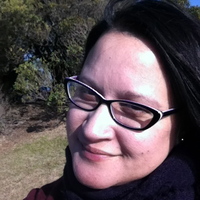Aurora Chang
Loyola University Chicago, School of Education, Faculty Member
- Education, Multiracial Identity, Undocumented Immigration, Rural Latino/a Students, Faculty of Color Experiences, Pre Service Teacher Education, and 15 moreQueer Theory, Queer Studies, Immigration, Educations, Chicana Feminist Theory, Cultural Studies, Culture, Teacher Education, Undocumented Immigrant Students and Learning, undocumented latino immigrants in the U.S., Sociology of Education, Race and Ethnicity, Race and Racism, International Migration, and Contemporary International Migrationedit
In this article, I relay the irony of my own path as an ‘illegal alien’ in the US – identifying the tension between being a successful student earning straight As and accolades for good citizenship, while hiding my undocumented legal... more
In this article, I relay the irony of my own path as an ‘illegal alien’ in the US – identifying the tension between being a successful student earning straight As and accolades for good citizenship, while hiding my undocumented legal status. Drawing from the notions of race, smartness and citizenship as social constructions, I use a Chicana feminist epistemology to argue that, from early on, my schooling process taught me, intentionally or not, that academic achievement, as perceived and assessed by my school teachers and administrators, would protect me from unwarranted inquiries about my ‘illegal’ status. But beyond academic achievement, I argue that my undocumented status greatly contributed to my unofficial and ‘undocumented intelligence,’ that is, the knowledge, skills and intuition fostered by living as an undocumented person. Negotiating the process of schooling as an underground ‘good’ citizen fostered intangible skills that undergirded my ability and motivation to do well in school and to interact with people in a cautiously savvy way. Critically thinking about my daily behaviors and interactions with authority, the significance of scholarly performance and the transnational conditions that led me to this conundrum, then, was not an option but a necessity for individual and familial survival. This narrative aims to introduce and relocate ‘undocumented intelligence’ from a place of obscurity to a central position in educational research – a site of knowledge construction, development and authorship.
Research Interests:
In this article, I seek to explore the tensions of what it means to be a " deserving " native researcher. I begin by experimenting with the meaning of a borderland love ethic as a theoretical framework that centers on: nurturing our... more
In this article, I seek to explore the tensions of what it means to be a " deserving " native researcher. I begin by experimenting with the meaning of a borderland love ethic as a theoretical framework that centers on: nurturing our strength to love in spaces of contention, tolerance of ambiguity as a revolutionary virtue, and humbly beginning anew again and again. Drawing from an extended interview with a participant of a larger study about undocumented students, I describe our positionalities with respect to privilege and undocumented status as the central foci. I use my own dilemma of understanding and reconciling my position as a once-undocumented immigrant to a now hyperdocumented (Chang, 2011) native researcher, studying undocumented people, to work through the possibility of a borderland love ethic. Relying primarily on the theoretical works of Anzaldúa (1987), Darder (2003), and hooks (2000), I ask, how we as scholars, enact love in our research amidst our seemingly contradictory positions of oppression and privilege. I contend that one possibility is by employing a borderland love ethic that embraces ambiguity, rejects binary positions and humbly acknowledges our constant state of arriving, both as researchers and participants.
Research Interests:
This article examined a group of Latina students studying abroad. It highlighted ways in which identity manifests itself for Latinas in different contexts. It used counterstories, stories of historically marginalized groups in education.... more
This article examined a group of Latina students studying abroad. It highlighted ways in which identity manifests itself for Latinas in different contexts. It used counterstories, stories of historically marginalized groups in education. Primary findings were cultural dissonance; a reflection of past, present, and privilege; and the critical consumption of knowledge. Institutional suggestions to increase participation of students of color in study abroad programs and recommendation of effective practices are provided.
Research Interests:
In this paper, five female scholars of color utilize the method of testimonio (testimony) to document their individual lived experiences as members of a three-year long research and writing collective. This collective served as a space of... more
In this paper, five female scholars of color utilize the method of testimonio (testimony) to document their individual lived experiences as members of a three-year long research and writing collective. This collective served as a space of liberation from the dominant discourses and practices the women were experi- encing in the academy. Each testimonio presents themes related to: shared strug- gles, friendship, trust and vulnerability, a sense of give and take, and their commitment to each other and the group. It is hoped these reflective testimonios (testimonies) contribute to the existing literature citing the benefits of such collaborations among female scholars and also encourages and guides other female academicians to develop their own research and writing collectives.
